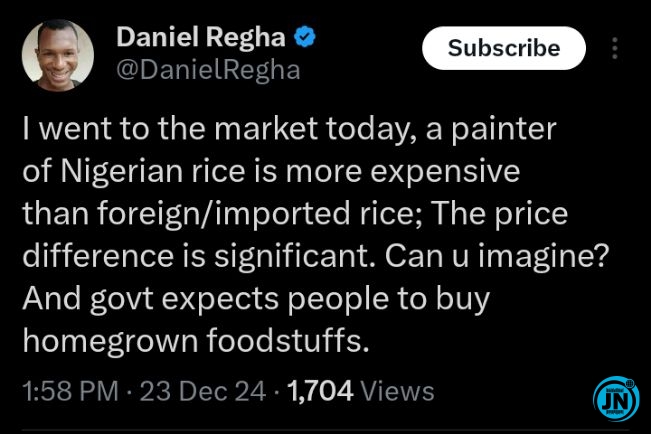X Influencer, Daniel Regha, has expressed deep concern over the rising cost of local rice in Nigerian markets, drawing attention to a critical issue affecting the affordability of homegrown foodstuffs for the average citizen.
Taking to X (formerly Twitter) on Monday, Regha shared his personal experience of visiting the market to purchase a painter of Nigerian-produced rice, only to be met with disappointment upon discovering that its price significantly exceeds that of foreign/imported rice. His remarks have since sparked a widespread discussion about the economic implications of this trend and its potential impact on consumer behavior.
Regha expressed his frustration with the situation, pointing out that such price disparities make it difficult for Nigerians to patronize locally-produced goods. He argued that with the cost of local rice surpassing that of imported varieties, it becomes increasingly challenging for citizens to prioritize supporting homegrown products, which should ideally be more affordable and accessible to the populace.
In his tweet, Regha lamented, “I went to the market today, a painter of Nigerian rice is more expensive than foreign/imported rice; The price difference is significant. Can u imagine? And govt expects people to buy homegrown foodstuffs.” This statement underscores his disappointment with the current state of affairs and calls attention to the need for government intervention to address the issue.

Regha’s post has since garnered significant reactions from social media users, with many echoing his sentiments and raising concerns about the pricing of local food items. Others highlighted the broader challenges facing the agricultural sector, including production costs, import dependence, and policies that inadvertently harm local farmers and discourage consumers from purchasing Nigerian-made products.
The influencer’s commentary has reignited conversations about the importance of making locally-produced goods more affordable for the average Nigerian. Many have called on the government to take proactive steps to reduce production costs, offer subsidies to local farmers, and implement policies that promote the competitiveness of homegrown foodstuffs in the market.
As the debate continues, Daniel Regha’s remarks have shed light on a pressing issue that affects not only the agricultural sector but also the economy at large. His observations serve as a reminder of the critical role that affordability plays in encouraging consumers to support local industries, and the urgent need for solutions to address the challenges facing Nigerian farmers and producers.

